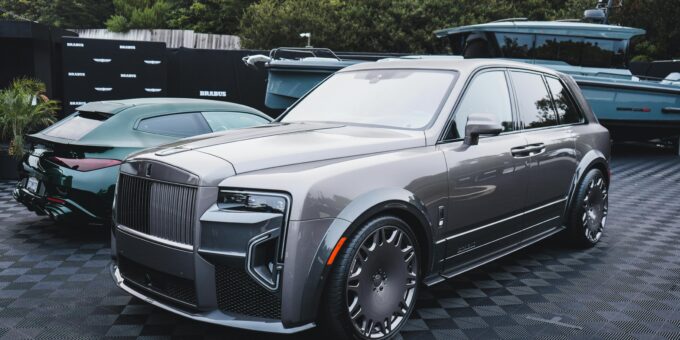
Safety is the cornerstone of every premium vehicle, and AI is taking this to a whole new level. Unlike traditional safety systems that rely on reactive measures, AI-enabled safety is proactive. It predicts risks, warns drivers ahead of time, and in some cases, takes corrective action before an accident occurs.
One example is collision avoidance systems. Using AI, premium cars can detect objects in real-time and calculate whether a collision is likely. If the driver doesn’t respond, the vehicle automatically applies the brakes or maneuvers safely around the obstacle.
Another life-saving feature is pedestrian and cyclist detection. Premium cars with AI can recognize not just moving vehicles but also vulnerable road users. Advanced algorithms help differentiate between objects, ensuring accurate detection even in poor lighting or bad weather.
AI also powers blind spot monitoring and cross-traffic alerts, reducing risks when changing lanes or reversing. Together, these features create a safety net that dramatically lowers the chances of human error—responsible for more than 90% of road accidents worldwide.
In luxury cars, where buyers expect perfection, AI ensures safety is not just a promise but a guarantee.
Enhancing Driver Assistance with AI
Driver assistance systems are evolving from basic aids to intelligent co-pilots, thanks to AI. In premium cars, Adaptive Cruise Control (ACC) is now smarter than ever. It doesn’t just maintain speed and distance but also predicts traffic flow, adjusting seamlessly for comfort and efficiency.
Lane-keeping systems are also enhanced by AI. Instead of rigid corrections, premium vehicles now apply smooth adjustments, mimicking human driving behavior. Some even handle complex lane changes on highways, making long-distance driving less tiring.
Parking has also become stress-free with AI-powered automated parking assist. Premium cars can now park themselves in tight spaces without the driver’s involvement. AI assesses the environment, detects obstacles, and executes perfect parking maneuvers.
The future looks even more promising. With continuous AI improvements, driver assistance systems may soon evolve into fully autonomous copilots capable of handling traffic jams, city driving, and long highway journeys with minimal human involvement.
AI in Predictive Maintenance for Premium Cars
Luxury cars are known for their performance, but even the most sophisticated machines require maintenance. AI is now helping premium vehicles anticipate issues before they become costly problems.
Predictive maintenance uses AI to monitor engine performance, brake wear, tire pressure, and battery health in real-time. Instead of waiting for a dashboard warning light, AI identifies early signs of malfunction.
For example, AI can detect unusual vibration patterns in the engine or subtle changes in tire grip. It then alerts the driver or schedules a maintenance appointment automatically with the service center.
This not only saves money but also enhances safety. Imagine AI detecting a potential brake failure days before it happens—that’s peace of mind for luxury car owners.
Brands like BMW and Mercedes-Benz have already rolled out AI-driven predictive maintenance systems, ensuring their premium cars remain in top condition without unexpected breakdowns.
AI-Powered Navigation Systems
Traditional navigation relied heavily on GPS and static maps. AI has taken navigation in premium cars to another dimension—real-time, intelligent route optimization.
AI-powered navigation systems integrate with traffic databases, weather forecasts, and even infrastructure updates to provide the fastest and safest routes. For example, if there’s an accident or a road closure ahead, AI instantly reroutes the vehicle to avoid delays.
These systems also learn from driver habits. If you prefer scenic routes over highways, the AI adjusts future recommendations accordingly. Premium cars now feature predictive routing, which considers your schedule, past journeys, and even your calendar to recommend routes automatically.
Furthermore, AI integrates navigation with other driving systems. For instance, when approaching sharp turns, it can adjust suspension settings for stability. On long highway stretches, it optimizes fuel efficiency by controlling throttle and speed.
For luxury car owners, AI ensures every trip is not only faster but also smoother and more enjoyable.
How AI Improves Passenger Comfort
Premium cars have always excelled at comfort, but AI takes personalization to the next level. Imagine stepping into your car, and it automatically adjusts the seat, mirrors, temperature, and even music playlist—all based on your preferences.
AI-driven comfort systems use machine learning to recognize driver and passenger habits. If you prefer cooler cabin temperatures in the morning but warmer settings at night, the car remembers and adjusts automatically.
AI also powers smart climate control, which doesn’t just adjust based on temperature but also considers passenger body heat, sunlight direction, and even humidity.
For rear-seat passengers, AI enhances the luxury experience with gesture controls, voice assistants, and entertainment personalization. Some premium cars now feature AI-driven massage seats that adapt pressure and intensity based on passenger stress levels detected from body sensors.
Comfort in luxury cars is no longer static—it evolves with you, ensuring every ride feels tailor-made.
You Can Also Read : How to Shape the Future of Luxury Cars with AI Innovations
AI for Energy Efficiency in Self-Driving Cars
Efficiency is not just about saving money—it’s about sustainability, a key demand among luxury buyers today. AI plays a vital role in optimizing energy consumption in premium cars, whether electric, hybrid, or fuel-powered.
For electric vehicles (EVs), AI manages battery usage, charging cycles, and regenerative braking. It predicts when and where you’ll need charging and suggests optimal charging stations along the route.
In fuel-powered cars, AI improves engine efficiency by controlling combustion in real-time. It adjusts fuel-air ratios, reduces emissions, and enhances mileage.
AI also manages energy distribution across in-car systems. For example, when more power is needed for acceleration, it temporarily reduces power consumption in non-essential areas like climate control or entertainment systems.
By making these micro-adjustments, AI helps premium cars achieve peak performance while maintaining eco-friendly operations.